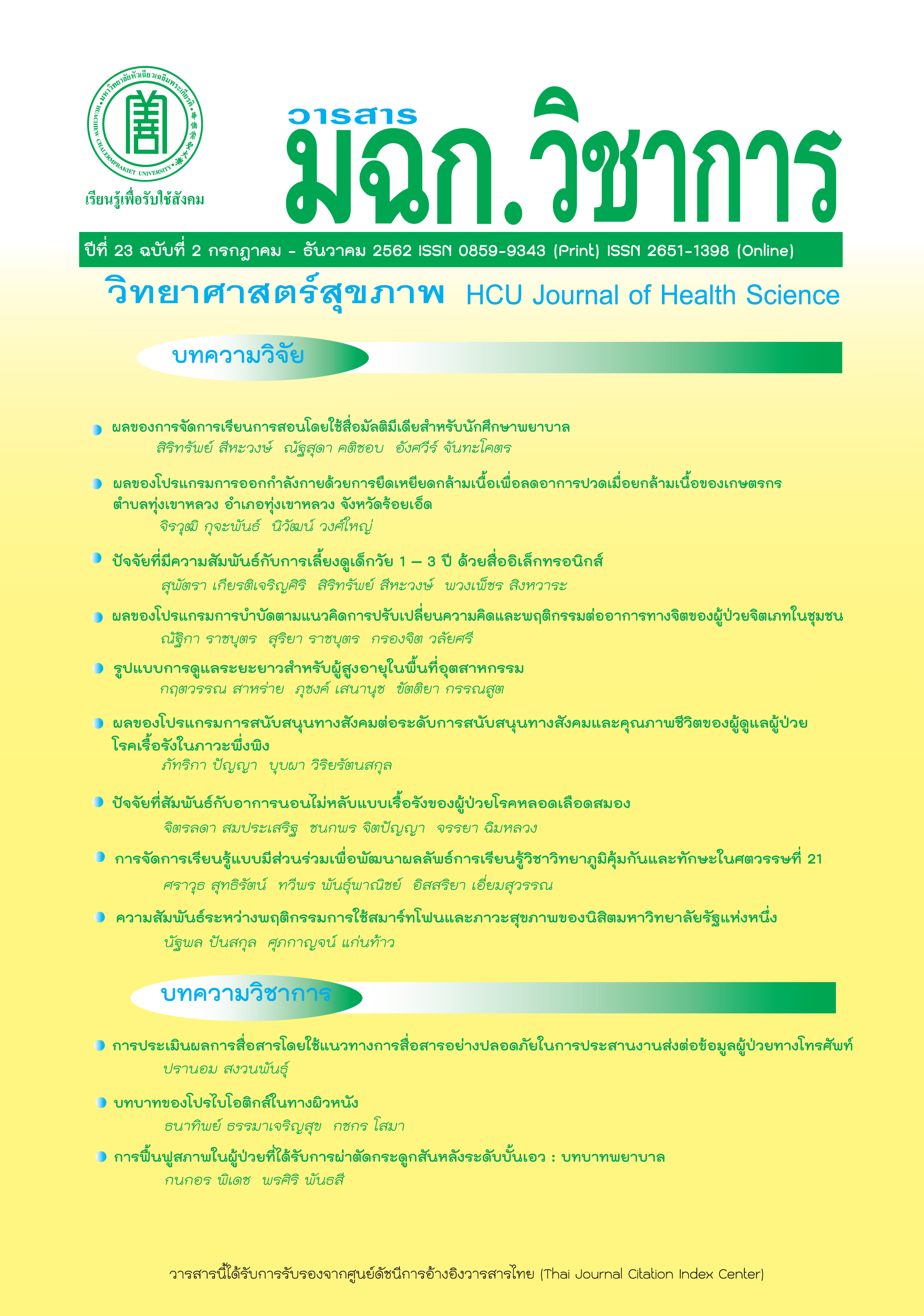Factors Correlated with Chronic Insomnia in Stroke Patients
STROKE, CHRONIC INSOMNIA, ANXIET, FATIGUE, PAIN, DYSFUNCTIONALN BELIEFS AND ATTITUDE ABOUT SLEEP
Abstract
The purpose of this descriptive research was to investigate relationships
among factors related to chronic insomnia in stroke patients including anxiety, fatigue, pain, Dysfunctional Beliefs and Attitude about Sleep. The samples were 132 stroke patients selected by a simple random sampling technique. They were followed up at the Outpatient Department of Police General Hospital and Prasat Neurological Institute. Questionnaires were composed of demographic information, State - Trait Anxiety Inventory, Fatigue Severity Scale, Pain Numerical rating scale, Dysfunctional Beliefs and Attitude about Sleep. These instruments were tested for their content validity by a panel of experts. Instrument was tested using reliability Cronbach’s alpha Coefficient obtained at .88, .1.00, .82, .97 and .86 Data were analyzed by using Descriptive statistics and Pearson’s product moment correlation coefficient.
The results were as follows:
1.The mean of chronic insomnia of stroke patients was at the “moderate insomnia” (mean = 17.95, SD = 4.00)
- Anxiety, Fatigue, Pain, Dysfunctional Beliefs and Attitude about Sleep (r=.476, .636, .503 and .026) were significantly positive correlated with chronic insomnia in stroke patients.
Downloads
References
2. Leppävuori A, Pohjasvaara T, Vataja R, Kaste M, Erkinjuntti T. Insomnia in ischemic stroke patients. Cerebrovase Dis. 2002;14(2):90-7.
3. Morin CM, Ruth B. Chronic insomnia. The Lancet. 2012; 379(9821):1129-41.
4. วนิดา ลุนกา. ปัจจัยคัดสรรที่สัมพันธ์กับอาการนอนไม่หลับของผู้ป่วยโรคหลอดเลือดสมอง [วิทยานิพนธ์]. กรุงเทพมหานคร: จุฬาลงกรณ์มหาวิทยาลัย; 2560.
5. Glovinsky P, Spielman A. The insomnia answer: breakthrough solutions for getting to sleep, staying asleep, broken sleep. New York: Perigee; 2006.
6. Morin CM, Drake CL, Harvey AG, Krystal AD, Manber R, Riemann D, et al. Insomnia disorder. Nat Rev Dis Primers. 2015;1:15026.
7. American Academy of Sleep Medicine. Westchester, IL: American Academy of Sleep Medicine. International classification of sleep disorders, 2nd Ed. Diagnostic and Coding Manual. 2005. pp. 51-5.
8. Chen PL, Lee WJ, Sun WZ, Oyang YJ, Fuh JL. Risk of dementia in patients with insomnia and long-term use of hypnotics: a population-based retrospective cohort study. PloS One. 2012;7(11) e49113.
9. Kim JS, Lee EJ, Chang DI, Park JH, Ahn SH, Cha JK, et al. Efficacy of early administration of escitalopram on depressive and emotional symptoms and neurological dysfunction after stroke: A multicentre, double-blind, randomised, placebo-controlled study. Lancet Psychiatry. 2017;4(1):33-41.
10. Tang WK, Lau CG, Mok V, Ungvari GS, Wong KS. Insomnia and health-related quality of life in stroke. Top Stroke Rehabil. 2015;22(3):201-7.
11. Thorndike R. Correlation procedures for research. New York: Gardner Press; 1978.
12. Spielberger CD. STAI manual for the state-trait anxiety inventory. Self-Evaluation Questionnaire 1970;1-24.
13. Melzack R, Katz J. Pain measurement in persons in pain. In: Wall PD, & Melzack R (Eds.). Textbook of Pain. London: Harcourt Publisher;1999.
14. Krupp LB, LaRocca NG, Muir-Nash J, Steinberg AD. The fatigue severity scale: Application to patients with multiple sclerosis and systemic lupus erythematosus. Arch Neural 1989;46(10):1121-3.
15. อวยพร สวัสดี. ปัจจัยคัดสรรที่สัมพันธ์กับความเหนื่อยล้าในผู้ป่วยโรคหลอดเลือดสมอง [วิทยานิพนธ์]. กรุงเทพมหานคร: จุฬาลงกรณ์มหาวิทยาลัย; 2557.
16. พัทรีญา แก้วแพง. ความสัมพันธ์ระหว่างปัจจัยคัดสรรกับอาการนอนไม่หลับของผู้ป่วยมะเร็งวัยผู้ใหญ่ [วิทยานิพนธ์]. กรุงเทพมหานคร: จุฬาลงกรณ์มหาวิทยาลัย; 2547
17. Morin CM. Insomnia: Psychological assessment and management. New York: Guilford Press; 1993.
18. Glozier N, Moullaali TJ, Sivertsen B, Kim D, Mead G, Jan S, et al. The course and impact of poststroke insomnia in stroke survivors aged 18 to 65 years: Results from the psychosocial outcomes in stroke (POISE) study. Cerebrovase Dis Extra. 2017;7(1):9-20.
19. สมภพ เรืองตระกูล. ความผิดปกติของการนอนหลับ การประเมินและการรักษา. กรุงเทพมหานคร:
เรือนแก้วการพิมพ์; 2550.
20. Miller CB, Espie CA, Epstein DR, Friedman L, Morin CM, Pigeon WR, et al. The evidence base of sleep restriction therapy for treating insomnia disorder. Sleep Med Rev. 2014; 18:415-24.
21. พัสมณฑ์ คุ้มทวีพร และ ลิวรรณ อุนนาภิรักษ์. การพยาบาลตลอด 24 ชั่วโมง เมื่อผู้สูงอายุนอนไม่หลับ. วารสารวิจัยทางการพยาบาล มหาวิทยาลัยมหิดล. 2540; 46(4):224-31.
22. Moore P, Dimsdale JE. Opioids, sleep, and cancer-related fatigue. Med Hypotheses 2002;58(1):77-82.
23. Bhalla A, Birns J. Management of post-stroke complications. Place:P Springer Internationa;2015.
24. Naess H, Lunde L, Brogger J, Waje-Andreassen U. Post-stroke pain on long-term follow-up: The Bergen stroke study. Neurol. 2010;257(9):1446-52.
25. สุพรพิมพ์ เจียสกุล, สุวัฒณี คุปติวุฒิ. ระบบต่อมไร้ท่อ. ในวัฒนา วัฒนาภา, สุพัตรา โล่ห์สิริวัฒน์,
สุพร พิมพ์ เจียสกุล, บรรณาธิการ. สรีรวิทยา 1. กรุงเทพมหานคร: ภาควิชาสรีรวิทยา คณะแพทยศาสตรศิริราชพยาบาล; 2551.
26. Morin CM, Stone J, Trinkle D, Mercer J, Remsberg S. Dysfunctional beliefs and attitudes
about sleep among older adults with and without insomnia complaints. Psychol
Aging. 1993;8(3):463.
27. Morin CM, Vallières A, Guay B, Ivers H, Savard J, Merette C, et al. Cognitive behavioral
therapy, singly and combined with medication, for persistent insomnia: a randomized
controlled trial. JAMA. 2009;301(19):2005-15.
Downloads
Published
How to Cite
Issue
Section
License
บทความที่ได้รับการตีพิมพ์เป็นลิขสิทธิ์ของวารสารวิทยาศาสตร์สุขภาพและสุขภาวะ
ข้อความที่ปรากฏในบทความแต่ละเรื่องในวารสารวิชาการเล่มนี้เป็นความคิดเห็นส่วนตัวของผู้เขียนแต่ละท่านไม่เกี่ยวข้องกับมหาวิทยาลัยหัวเฉียวเฉลิมพระเกียรติ และคณาจารย์ท่านอื่นๆในมหาวิทยาลัยฯ แต่อย่างใด ความรับผิดชอบองค์ประกอบทั้งหมดของบทความแต่ละเรื่องเป็นของผู้เขียนแต่ละท่าน หากมีความผิดพลาดใดๆ ผู้เขียนแต่ละท่านจะรับผิดชอบบทความของตนเองแต่ผู้เดียว




